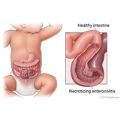Our Health Library information does not replace the advice of a doctor. Please be advised that this information is made available to assist our patients to learn more about their health. Our providers may not see and/or treat all topics found herein.
Topic Contents
Necrotizing Enterocolitis
Condition Basics
What is necrotizing enterocolitis?
Necrotizing enterocolitis is infection and inflammation of the intestine. It is most common in babies who are born early (premature). Many newborns who have it go on to live healthy lives. But if the infection becomes severe, it can cause severe damage to the intestine, which can be deadly. Some children may have ongoing problems with digestion, growth, or development.
This condition usually happens within the first 2 weeks after birth. But it may occur up to 3 months after birth.
What causes it?
Doctors aren't sure what causes this condition. It may occur when the immune and digestive systems do not develop in the right ways. This can happen when a baby is born early or when there are problems during pregnancy or delivery.
Necrotizing enterocolitis is less common in babies who are fed breast milk.
What are the symptoms?
Symptoms depend on how severe the problem is. They may include:
- A swollen, tender, red, or shiny belly.
- Constipation.
- Dark, black, or bloody stools.
- Low or unstable body temperature.
- Chills and fever.
- Fast heartbeat and breathing.
- Not wanting to eat.
- Vomiting.
- Being less active or having little energy.
How is it diagnosed?
The doctor will examine your baby. The doctor may do tests, such as:
- An X-ray of your newborn's belly.
- An ultrasound of the belly.
- A test to check for blood in your baby's stool (fecal occult blood test).
- Tests to check for bacteria in the stool, blood, urine, or spinal fluid.
How is necrotizing enterocolitis treated?
Your baby will be treated in a hospital neonatal intensive care unit (NICU). Treatment usually lasts from several days to about 2 weeks. Treatment includes intravenous (I.V.) feeding, antibiotics, and a tube that goes in the nose to the stomach to remove fluids and gas from the intestine.
If your baby does not get better with treatment or gets a hole in the intestine, your baby may need surgery. Surgery usually means having two procedures weeks or months apart. The first surgery removes damaged parts of the intestine and may create a colostomy or ileostomy so that the intestine can heal. (With an ostomy, stool leaves the body through an opening in the belly and collects in a bag.) A second surgery usually will be done to close the ostomy so that stool can pass through the body normally again.
After treatment, your baby will be ready to leave the hospital when they are eating well and are not losing weight. The nurse can show you how to feed and care for your baby at home.
It is normal to feel overwhelmed when your baby has health problems. It can be stressful to watch a tiny newborn get medical treatment. You may feel frustrated if you can't hold your baby as often as you want or can't breastfeed your baby. It may help to talk about your feelings and concerns with a social worker or counselor. Be sure to ask your baby's doctors about anything you don't understand.
How can you prevent it?
Feeding the baby breast milk may help prevent enterocolitis.
Related Information
Credits
Current as of: October 19, 2024
Author: Ignite Healthwise, LLC Staff
Clinical Review Board
All Ignite Healthwise, LLC education is reviewed by a team that includes physicians, nurses, advanced practitioners, registered dieticians, and other healthcare professionals.
Current as of: October 19, 2024
Author: Ignite Healthwise, LLC Staff
Clinical Review Board
All Ignite Healthwise, LLC education is reviewed by a team that includes physicians, nurses, advanced practitioners, registered dieticians, and other healthcare professionals.
This information does not replace the advice of a doctor. Ignite Healthwise, LLC disclaims any warranty or liability for your use of this information. Your use of this information means that you agree to the Terms of Use and Privacy Policy. Learn how we develop our content.
To learn more about Ignite Healthwise, LLC, visit webmdignite.com.
© 2024-2025 Ignite Healthwise, LLC.





